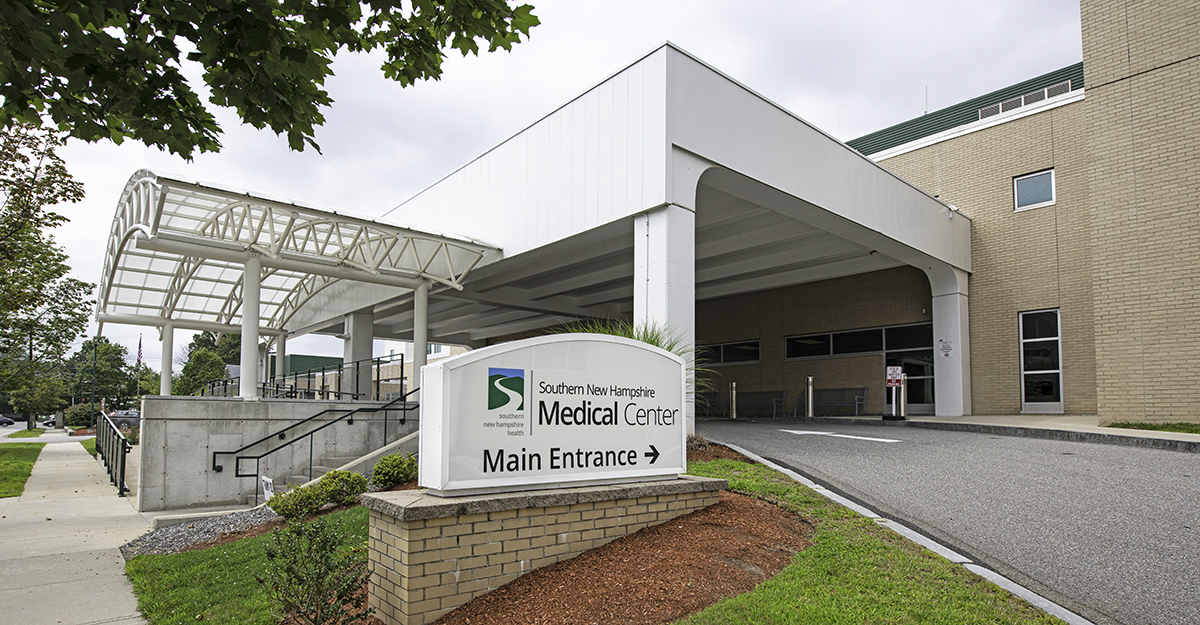Southern NH Medical Center
8 Prospect Street
Nashua, NH 03060
Phone: 603-577-2000
Hours vary by service

8 Prospect Street
Nashua, NH 03060
Phone: 603-577-2000
Hours vary by service
Southern New Hampshire Medical Center offers the convenient location and friendly, personalized experience of a community hospital, with the world-leading specialty care and resources of our clinical affiliate Massachusetts General Hospital. And thanks to our network of over 60 primary and specialty care practices in the greater Nashua area, we can provide a seamless care transition when it’s time for you to leave the Medical Center.
Our care teams work together to provide the care you need — so you can focus on getting better.
With 188 beds and close to 100,000 visits each year, you can find peace of mind knowing when urgent or emergent medical attention is required, our dedicated team of Trauma and Emergency professionals will be here to serve your needs, 24 hours a day, 7 days a week, 365 days a year!
We understand how essential it is for you to move freely and enjoy life without pain or limitation. From initial diagnosis to comprehensive treatment plans and rehabilitation, trust Southern NH Orthopedics to restore your vitality and quality of life. Our expert providers offer comprehensive surgical and nonsurgical treatments for orthopedic-related injuries and conditions related to ankle, elbow, foot, hand, hip, knee, shoulder, and wrist.
The Birth Place at Southern New Hampshire Medical Center is where comfort, care, and connection come together to create the perfect environment for your baby’s arrival. We want your baby’s birth to be a special experience. We provide a warm and caring environment where you and your family can feel at ease. Our beautiful surroundings include spacious and private birthing suites for labor, delivery, recovery, and post-partum (after birth) stay.
At Southern NH Health Weight Management, we believe that everyone deserves to live their best life. Weight loss is personal. That’s why the team at Southern New Hampshire Weight Management works with each patient to design an individualized treatment plan within a supportive and nonjudgmental environment.
Your family’s health deserves expert care at every stage of life. At Southern New Hampshire Health, our primary care services are designed to keep you and your loved ones healthy, happy, and supported. From pediatric care for your little ones to preventive care and same-day sick visits, we’re here to meet your healthcare needs with compassion and expertise.
Our expert team of cardiologists has the resources and experience to offer the most sophisticated, cutting-edge cardiac services, giving you the best treatment at your convenience. Should you need open heart surgery, or advanced stroke treatment, we partner with Massachusetts General Hospital, and other leading tertiary (specialty) care providers. We’ll coordinate your care and continue treatment at SNHH as soon as possible.
When you need surgery – whether it’s a same-day procedure or a more complex surgery – you can count on Southern New Hampshire Health's talented and compassionate surgical staff to provide the care you need so you can get back to doing what you love.
For questions about services and practices located at Southern NH Medical Center, please reach out for assistance.